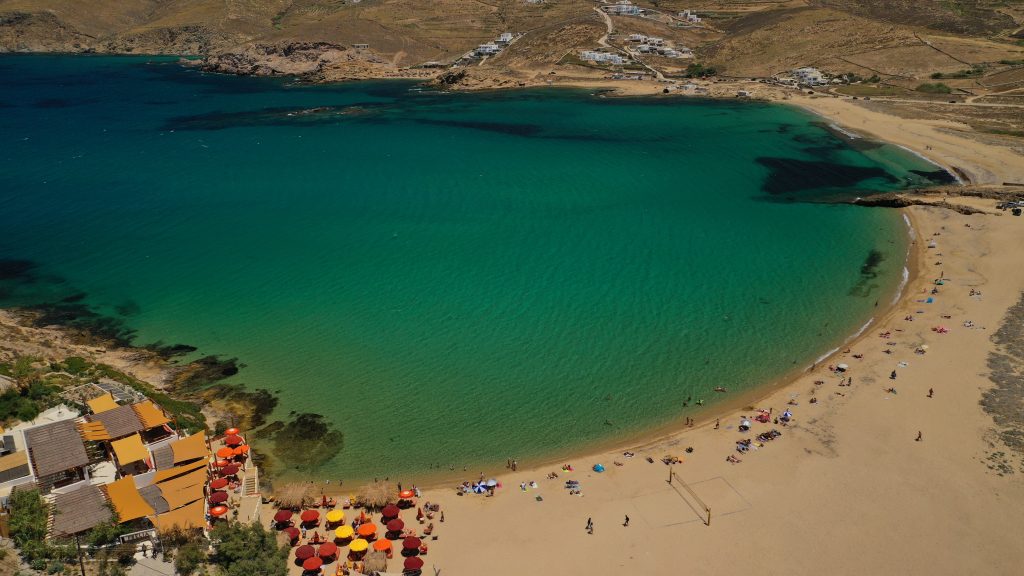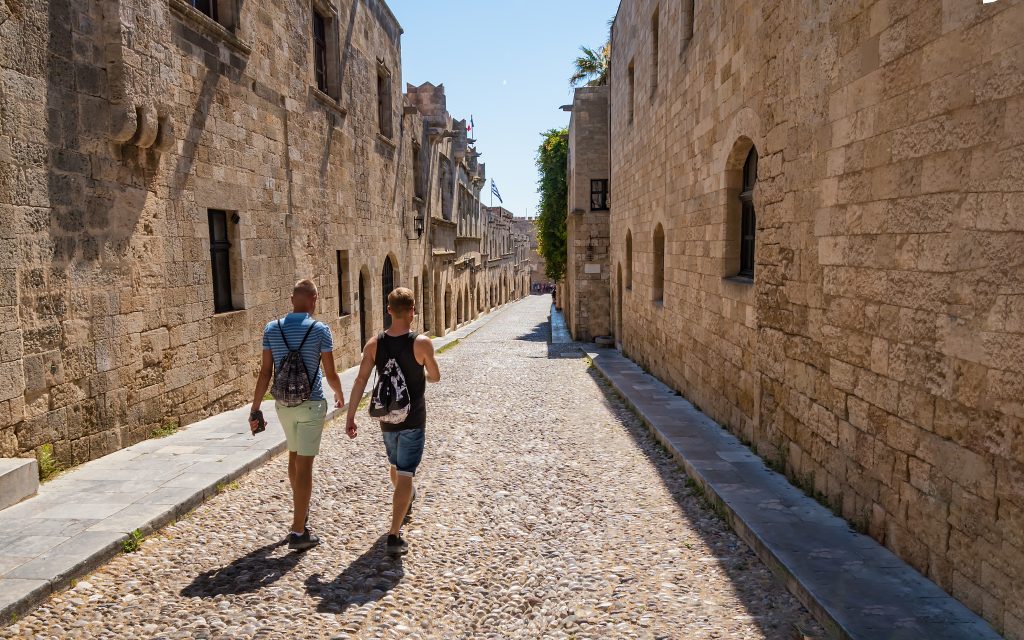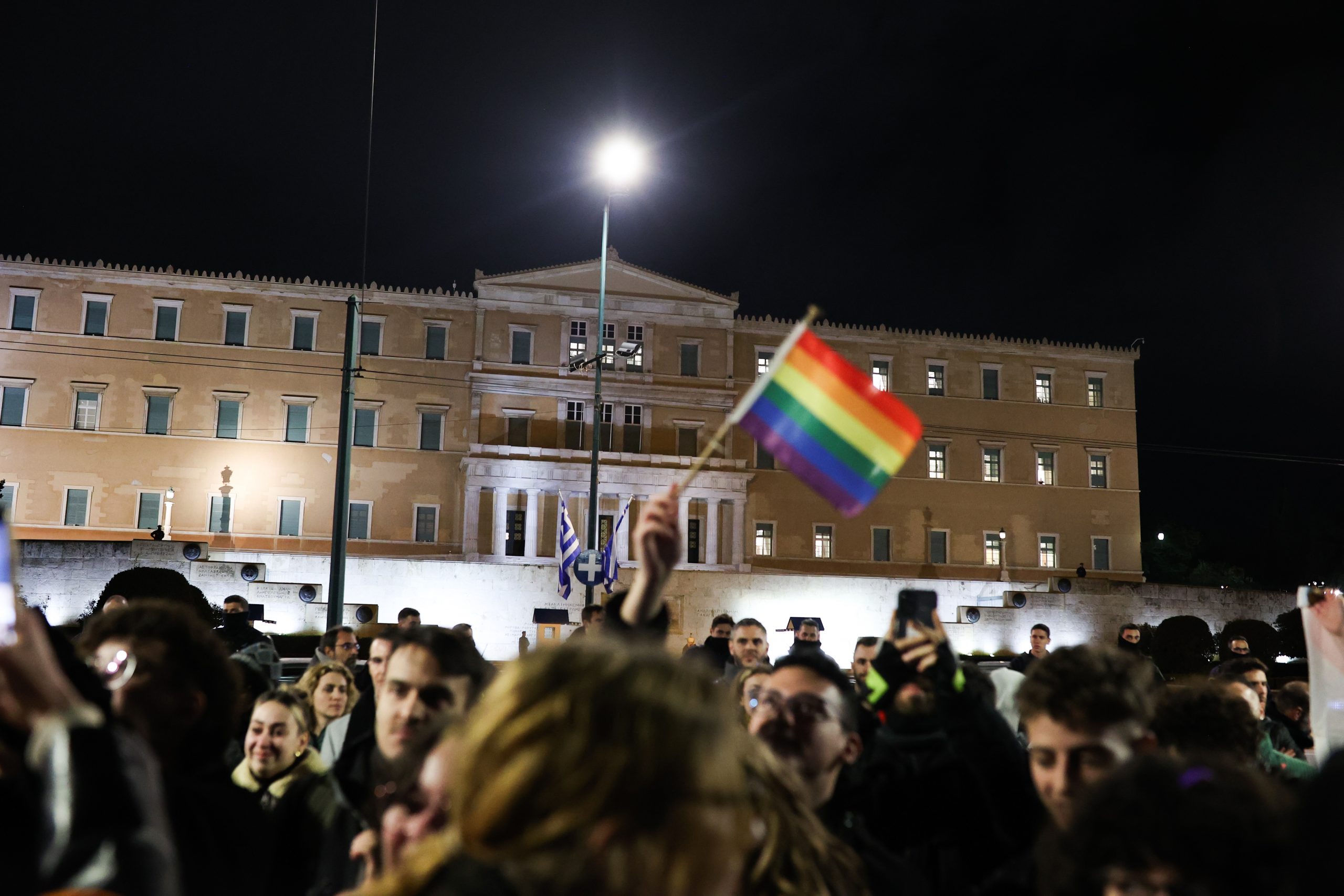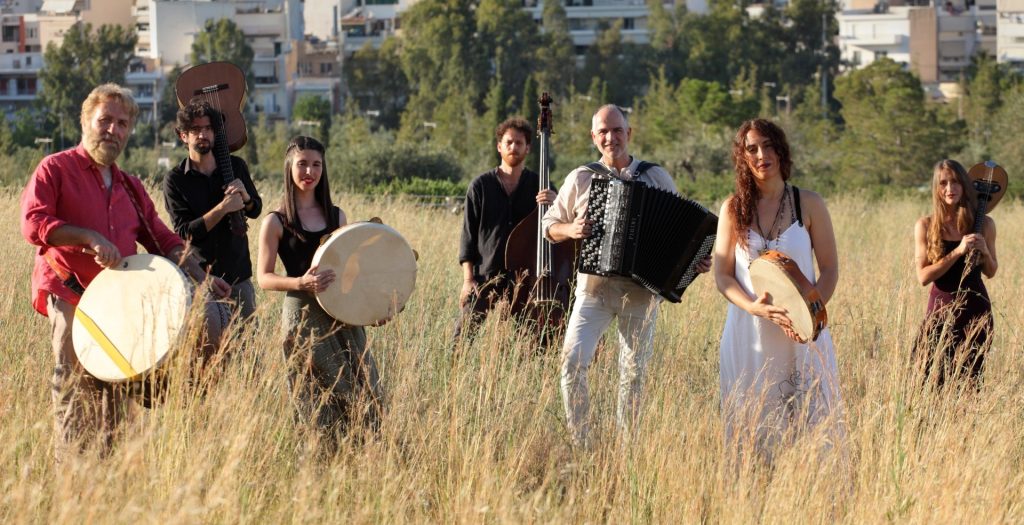On February 16 this year, Greece became the first Orthodox Christian nation in the world to legalize same-sex marriage, the 16th in the EU, and the 37th country globally to do so enabling same-sex couples to now legally adopt children.

Greeks cheering a bill tabled in Greek parliament which legalizes same-sex marriage in Athens, Greece on February 15, 2024.
LGBTQ+ organizations, families, and couples in Greece were euphoric.
Just last week, the Greek tourism ministry sent out a circular; a code of conduct outlining terms and proper practice to prevent discrimination against LGBTQ+ employees in tourism businesses days after it teamed up with Queer Destinations, a member of the International Gay and Lesbian Travel Association (IGLTA), as a step toward establishing Greece as a safe and inclusive LGBTQ+ destination.
Gay Travel Greece: The Mykonos Effect
LGBTQ+ travelers have known about Greece’s ‘openness’ since the early 1970s thanks to the vibrant parties and drag shows at Pierro’s bar on Mykonos which attracted the world’s jet set and established the island as a top gay destination.

Ftelia Beach on Mykonos, one of the first Greek islands to welcome LGBT travelers.
This year, Thessaloniki will be hosting EuroPride 2024 winning the event from Norway, Belgium and Germany. Athens has been hosting a gay pride parade for two decades. Since the 1980s, the island of Lesvos has hosted the International Eressos Women’s Festival attracting the first lesbians to the birthplace of Greek poet Sappho, and now it also hosts the Queer Ranch Festival. In Athens, the municipality offers “LGBTQ+ Athens with a Local” tours introducing visitors to the scene.
At the same time, according to the Asher & Lyrie LGBTQ+ Travel Safety Index, Greece is moving up, ranking 35th among 200 countries in 2023.
LGBTQ+ Tourism Valued at Over $200bn Annually
According to the World Travel & Tourism Council (WTTC), the LGBTQ+ segment has a vast potential with an estimated value of over $200 billion annually. Studies add that LGBTQ+ travelers tend to travel more and spend more. This means that above and beyond Mykonos, the decision to legalize same-sex marriage can serve as a springboard for other destinations in Greece to tap into a growing and very lucrative market.
“The LGBTQ+ travel & tourism market has always been attracted to Greece. Of course, it always helps a country’s tourism profile to show progress with respect to equal rights for all citizens. It could also create a demand for same-sex weddings in Greece, and that would be an interesting opportunity,” Andreas Stylianopoulos, president and owner of Navigator Travel & Tourist Services, tells To Vima English Edition.
Stylianopoulos, whose Athens-based company founded 62 years ago has been a frontrunner in LGBT travel and awarded last year for its LGBTQ+ cruise vacations, goes on to add that gay and lesbian tourism has been an organized segment for many decades and “an extremely desirable market”.
“These markets have been very lucrative for the cruise industry as well, dating back to the late ’70s,” he says and stresses that “attracting their business is no different to attracting any other niche market”.
Auston Matta, one of the two American founders of Two Bad Tourists, tells To Vima English Edition, that he believes the decision will have a positive impact but change will not happen overnight. “It will be seen by many as a step toward greater inclusivity and equality,” he says as many LGBTQ+ individuals prioritize visiting destinations that are welcoming.
At the same time, Jill Cruse, vice president of guest experience at Olivia Travel, the world’s first lesbian travel brand founded in 1973, tells To Vima English Edition that the decision opens up a new potential. “You may get more LGBTQ+ women traveling in couples or on honeymoons,” she says, adding however that Greece’s tourism marketing strategies should go the extra mile and finally “include more photos of two women in marketing pieces, and of different ages. We have been so under-represented in this area”.
“For as long as I can remember,” Cruse says, “any marketing attempt to get the LGBTQ+ community is 99% about men.” Olivia Travel has been coming to Greece since the early 1990s with cruise packages designed for women that include the Greek islands with pre- and post-arrangements in Athens and other parts of the country. It is the only company in the world offering cruises catering just to lesbians.
Is Greece Ready to Ensure Inclusivity and Safety for LGBTQ+ Travelers
According to Stylianopoulos, who is also a member of the Greek Tourism Confederation (SETE) and the American-Hellenic Chamber of Commerce, as well as of other tourism trade bodies, Greece has through the decades shown a very hospitable face to LGBTQ+ visitors. “Greek society, with all its underlying cultural reservations, is actually a very gracious host towards all visitors regardless of their sexual orientation,” he says.

Tourists taking a stroll in the Medieval City of Rhodes, an UNESCO World Heritage site in Greece.
This viewpoint is echoed by Matta, who adds that he and his partner have never had a bad experience in Greece from intolerance or homophobia nor have any of their friends or guests on the trips they organize. Matta’s Spain-based company reaches some 1 million LGBTQ+ travelers annually and offers customized travel experiences. He describes trips to Greece over the years as “wonderful”. But he goes on to note that there is a clear difference in the feeling you get in Athens vs Amsterdam, Madrid or Berlin. “These cities have a reputation for being extremely welcoming for LGBTQ+ individuals. In Athens, the feeling we got was more of reluctant tolerance vs acceptance or embracing of the LGBTQ+ community”.
Cruse also agrees that Greece has always been a top destination for the LGBTQ+ women community, but she goes on to stress that in addition to showing more women couples in advertising, it is crucial to make LGBTQ+ women feel safe. “When they check into a hotel, they do not want to be questioned about their reserved king-sized bed. If they say it’s an anniversary or a honeymoon, they want the same acknowledgement and amenities as their straight friends. Going that extra step to acknowledge, accept, and celebrate them as a couple is really important,” Cruse says.
Greece Welcomes LGBTQ+ Travelers
Undoubtedly, last month’s decision has sent a loud and proud message to the world that Greece welcomes the LGBTQ+ crowds. How could Greek tourism travel stakeholders tap into this potentially profitable niche market?
For Stylianopoulos it is clearly a matter of quality and professionalism. “Well-run hotels and professional tour operators,” he says, “treat everyone the same. This market may have special or diverse interests, but it is no different to any other niche market,” he says, adding that for Navigator.gr, LGBTQ+ guests are equal in all aspects.
Matta adds that the private sector can lead the way and accelerate change bringing Greece to the forefront of LGBTQ+ travel. “Once private sector initiatives are developed, DMOs can promote and amplify that work.” At the same time, it would be easier for individual regions, cities or islands to take the lead, much like Mykonos has done and slowly build their reputation of inclusiveness with LGBTQ+ owned tourism businesses leading the way. “This will take time and needs to be done in an authentic and meaningful way,” he says.
Cruse goes on to add that joining the IGLTA is also “a great resource for Greek tourism and hotels. The LGBTQ+ community uses IGLTA as a resource when planning their vacations/holidays,” she says.









